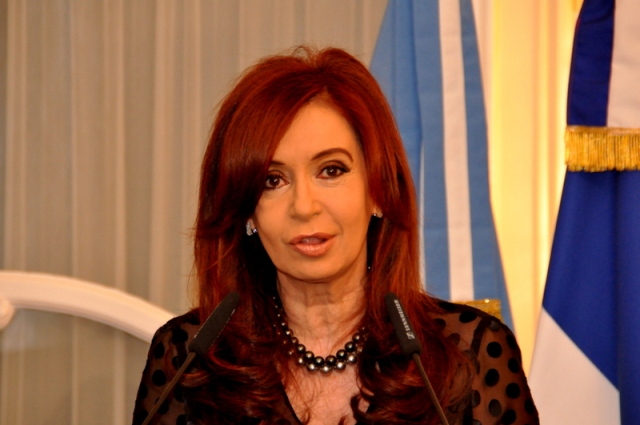Leveson: The way ahead for a free press in the UK
A tough but voluntary regulator is the best way to ensure a free press and a fair society, Index says in a new policy note (more…)
A tough but voluntary regulator is the best way to ensure a free press and a fair society, Index says in a new policy note (more…)
Attempts to push through a media law in Argentina could end up destroying one of the country’s most critical broadcast outlets. Ed Stocker reports
A bitter battle between Argentina’s largest media empire, Grupo Clarín, and the government shows no signs of ending. President Cristina Fernández de Kirchner, continues to try and force through a media law that would see the break up of the conglomerate, the most critical voice against her administration.
Three years ago Congress passed an anti-monopoly bill with broad aims of making the Latin American country’s audio-visual landscape a more democratic, plural environment. But critics argue that its real aim is to stifle dissenting voices, including Clarín.
The law has positive aspects on the surface, argued Guillermo Mastrini, a professor at Quilmes University specialising in media. He said the new bill allows non-profit organisations a third of Argentina’s much-coveted broadcast licences for the first time — potentially setting a benchmark for regional press standards.
“But the real idea that needs to be understood,” he explained, “is that the media law has been much more democratic in its drafting than its implementation. The government has used a decent law to punish broadcast media that doesn’t toe the official line.”

Argentinian president Cristina Fernández de Kirchner. Hugo Passarello Luna | Demotix
The implementation of the law has proved difficult since Clarín went to a tribunal over the constitutionality of a clause stating that companies with too many licenses — the right to broadcast in a certain region — would have to divest.
While a ruling on the constitutionality is still pending, Clarín was granted a temporary injunction. [Update 17/12: a judge has ruled this clause constitutional, and Clarín will now appeal. In the interim the federal media authority says it will now forcibly step in and start the transfer of licences.
What has ensued has been a complex and heated legal scuffle, with the government initially arguing that the injunction would end on 7 December, citing advice handed down by the country’s highest judicial body, the Supreme Court.
The government prepared for the 7 December deadline — when the law would apparently come into force — with fervour, saturating pro-government channels with adverts about a date they had renamed “7D” to give it a catchy ring. Clarín retaliated on its networks.
Then, at the last moment, an appeals court extended the injunction, despite the Supreme Court’s stance, thwarting the law once again.
For Daniel Dessein, freedom of expression president at the Argentine Association of Journalistic Entities (Adepa) group, 7D was part of the government’s increasingly confrontational stance towards the media.
“The government elected the date of 7 December as a historic and symbolic moment when the application of the law would allow democracy to triumph,” he said. “It chose a number and a letter for the day, 7D, which clearly alludes to D-Day and the Normandy invasion. The government was basically announcing an attack.”
That “attack” hasn’t gone the government’s way, and it has launched an appeal while strongly questioning the judiciary’s objectivity. The Permanent Council for the Protection of Judicial Independence, a national body of judges, in turn denounced what it called “institutional aggression” against judges.
According to Afsca, the body charged with implementing the media law, the proposed legislation isn’t singling out one group. Earlier this month, its president Martín Sabbatella said that “the spirit of Afsca has always been that no one is different and the rules are the same for everyone”.
Afsca argues that Grupo Clarín is the only media conglomerate that has refused to present divestment plans, from among the some 20 companies that exceed the new licence rule.
The media law continues to divide international opinion. The Florida-based Pan-American Press Society (SIP) sent a delegation to Argentina for the failed 7 December deadline. It later released a statement denouncing what it saw as “serious problems regarding the free exercise of journalism in the country”.
On the other hand, Frank La Rue, UN special rapporteur for freedom of expression, said on a visit to Argentina in October that the law was “a model for the whole continent and for other regions in the world”.
Clarín argues that its TV and radio stations are some of the few “independent” voices left in Argentina, a country where many stations are dependent on government advertising to stay afloat.
Advocates of the law say it provides a much-needed overhaul of legislation that dates back to the last military dictatorship (1976-83). But for Guillermo Mastrini, the turf war with Clarín is holding up its progressive elements.
“The government has focused its forces more on destroying Grupo Clarín than allowing new broadcast outlets, companies and ideas from civil society to flourish,” he said. “That is the great failure of this law.”
Ed Stocker is a freelance journalist based in Buenos Aires. Follow him on Twitter: @Ed_Stocker
Read more of his work on censorship and free expression here
 Leveson’s “statutory underpinning” is no way to protect press freedom, says Kirsty Hughes
Leveson’s “statutory underpinning” is no way to protect press freedom, says Kirsty Hughes
(more…)
Worrying news from Buckingham Palace Road this morning: the Telegraph is reporting that Culture Secretary Maria Miller’s special adviser Joanna Hindley warned its reporters of Miller’s connection to the Leveson report before the newspaper published details of her expenses, notably that Miller’s parents lived in her taxpayer-funded second home.
The paper took the rare step of choosing to disclose details of the conversation in light of concerns over “the potential dangers of politicians being given a role in overseeing the regulation of the press.”
The key passage from their story:
When a reporter approached Mrs Miller’s office last Thursday, her special adviser, Joanna Hindley, pointed out that the Editor of The Telegraph was involved in meetings with the Prime Minister and the Culture Secretary over implementing the recommendations made by Lord Justice Leveson.
“Maria has obviously been having quite a lot of editors’ meetings around Leveson at the moment. So I am just going to kind of flag up that connection for you to think about,” said Miss Hindley.
Miss Hindley also said the reporter should discuss the issue with “people a little higher up your organisation”.
In an email statement, a DCMS spokesperson said:
Mrs Miller’s special adviser raised concerns with a journalist about the nature of an approach to Mrs Miller’s elderly father. Her advisor noted that Mrs Miller was in regular contact with the paper’s editor and would raise her concerns directly with him, which Mrs Miller did subsequently.
However, this is a separate issue to on-going discussions about press regulation. Mrs Miller has made the Government’s position on this clear.
This “flagging up” is worrying, but it’s not the first instance of those in power feeling that they already have right to tell reporters what to print. Remember the Spectator’s Fraser Nelson’s revelation last month, pre-Leveson?
In the last few weeks, I have had an MP and a government minister call asking me to (respectively) discipline a Spectator writer who had annoyed him on Twitter and take down a blog that was ‘over-the-top’.
Meanwhile, Evan Harris of the Hacked Off campaign, which pushes for tougher regulation of the press, has apparently suggested Miller should “recuse herself” from Leveson issues.
Those of us concerned about a post-Leveson environment in which emboldened MPs are able to intimidate the press have been told we’re overreacting. But today’s report proves our point: it is precisely the sort of thing that could prevent journalists from doing their jobs and endangers press freedom and the role of the fourth estate in holding politicians to account. And it does little favours to the argument that the state should have a role in regulating our papers.
Marta Cooper is an editorial researcher at Index. Follow her on Twitter: @martaruco